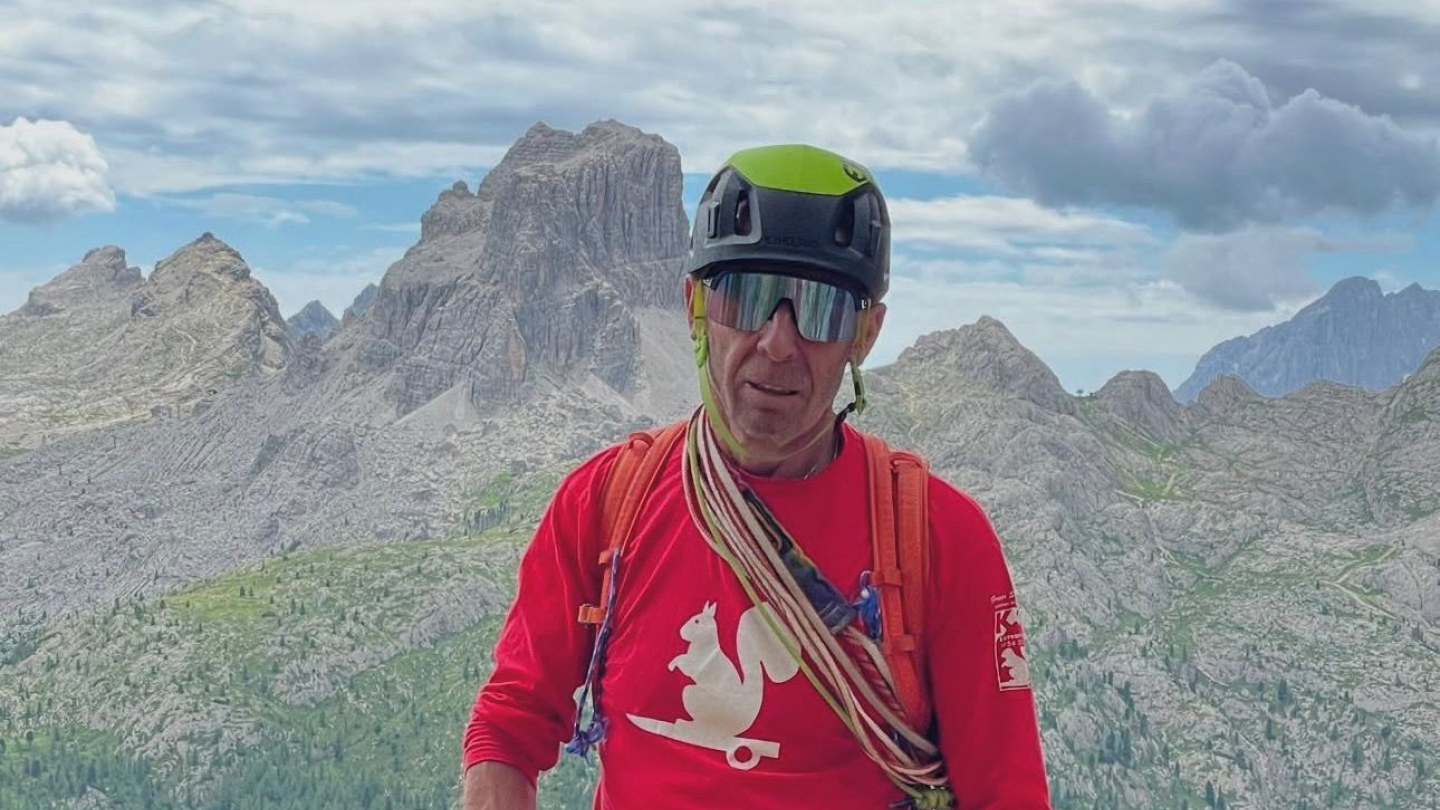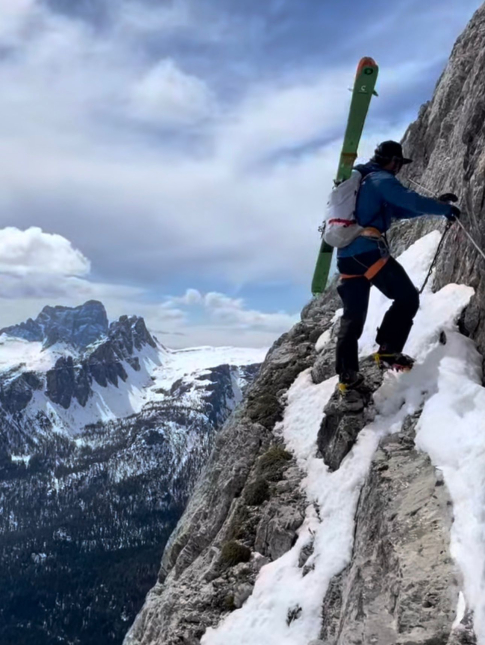
Icons of Italian service
Mario: the most inspiring mountain guide in the Dolomites – A story of Italian excellence

Amid the majestic peaks of the Dolomites, where the rock brushes the sky and silence guards an ancient legacy, we meet Mario Dibona Moro – Mountain Guide, National Instructor and Knight of the Italian Republic. Through his project Dolomiti SkiRock, he combines technical expertise, a spirit of adventure and a deep passion for hospitality, redefining the way people experience the mountains. Each journey becomes an invitation to slow down, to listen to unspoilt nature, and to rediscover the authenticity of this remarkable alpine landscape. Through his words, we are invited to explore the deepest and most untamed soul of the Dolomites.
How was Dolomiti SkiRock born, and what vision inspired you to create a project that blends technique, adventure and hospitality?
The idea of creating Dolomiti SkiRock was born about twenty years ago, from a desire to change the relationship between client and mountain guide.
Until then, visitors arriving in Cortina would plan their activities once on site. I thought it would be more useful to offer a website where guests could discover and book experiences in advance, before their trip to the Dolomites.
I wanted a name that captured the dual soul of these mountains – snow and rock – hence “SkiRock.”
The project was designed to make the mountains more accessible and to convey the professionalism of Mountain Guides right from the first online contact. The idea turned out to be a success.
What does it mean to you to accompany a guest in the mountains?
As a child, every Sunday my parents took me to the mountains. My father taught me to look at them, to admire them, and to respect them.
Today, as a guide, I try to pass on that same love and respect to my guests: accompanying them means sharing a way of living the mountains, helping them understand that they are not a place to conquer, but a place to understand and to care for.
Your skills range from guiding to teaching and communication. Can you explain the role of a mountain guide and how it differs from that of an environmental hiking guide (AIGAE)?
The Mountain Guide is a professional recognised by the Italian State (Law no. 6 of 2 January 1989).
The training path is long and demanding, lasting around four years, and requires advanced technical skills: climbing, mountaineering, skiing, safety, meteorology, geology and naturalistic knowledge.
A mountain guide can accompany people on any kind of terrain, both in summer and winter, teaching mountaineering techniques and transmitting the culture of the mountains.
The environmental hiking guide, on the other hand, follows a shorter training path and can accompany only on routes that do not require alpine techniques or equipment.
Both figures are important, but their roles and competences are very different.
Is there a lesser-known aspect of these mountains – a tradition, a story, or a daily gesture – that you like to share with your guests?
I often tell stories and legends connected to the Dolomite peaks, because every mountain holds a soul and an ancient tale.
But what I love to share most is silence: that moment when, once you reach the summit, everything stops and only the wind can be heard. It is then that one truly understands the value of the mountains – and of simplicity.

What does excellence mean to you?
For me, excellence is not only about technique, but about attention to people.
It means understanding guests’ desires, making them feel comfortable, and helping them feel part of the mountains.
The extra mile is that smile, that word of encouragement, or that quiet pause in front of a breathtaking view that stays with you forever. That is where the memory that lasts over time is born.
What kind of experiences do you offer with Dolomiti SkiRock, and what do you hope to convey to those who take part in your activities?
Dolomiti SkiRock offers a wide range of summer and winter activities designed for everyone – from beginners to those seeking more challenging experiences.
Each outing is an opportunity to teach not only technique, but also safety and awareness.
We also guide our guests through the history of the Great War, visiting trenches and fortifications that are still visible today, and we explore the geology of these unique mountains.
And then there are the local legends and stories, which turn every excursion into a journey through the Dolomite culture.
Your personal story has been deeply connected to the mountains since childhood. Where does your passion for climbing and mountaineering come from, and how does it shape your everyday work?
My passion comes from my father, who passed on his love for the mountains to me. As I grew up, I cultivated it with friends until it became my profession. When I started, about forty years ago, guiding was mostly a summer and seasonal job. Today, if you organise yourself well, you can work all year round.
For me, mountaineering is not just a profession or a passion – it is a way of life that will always stay with me.
Sustainability, respect and safety are key values in mountain tourism. How do you integrate these into your work and your relationship with guests?
Most of our clients are international, and I’m pleased to say they show great respect for our mountains.
Safety is our top priority: every step in the alpine environment requires care and competence, and it is the guide’s role to ensure peace of mind and trust. As Goethe once said: “Mountains are silent masters who make silent disciples.”
The mountain teaches – if you know how to listen.
Finally, what does excellence mean to you? In your work, what is that “something extra” – that extra mile – which makes an experience unforgettable?
For me, excellence is not only about technique, but about attention to people.
It means understanding guests’ desires, making them feel comfortable, and helping them feel part of the mountains.
The extra mile is that smile, that word of encouragement, or that quiet pause in front of a breathtaking view that stays with you forever. That is where the memory that lasts over time is born.
Is there a memory or anecdote from your career as a guide that best represents the spirit of Dolomiti SkiRock?
One of my fondest memories is the first time I accompanied a child and his father to their very first summit. At the end, the little boy said to me: “Mario, I want to be a guide like you.”
That moment made me realise that my job is not just to lead, but to share passion and leave something lasting in people’s hearts.
Cortina will host the 2026 Winter Olympics: how do you experience this event, and what opportunities do you see for the region and for those, like you, who work closely with the mountains?
In this pre-Olympic period, Cortina is going through many changes, with construction sites and works that sometimes cause inconvenience.
But I believe the Olympics will bring worldwide attention that can truly enhance our history, our culture and our mountains.
It will be important, however, not to forget the authentic soul of Cortina – a mountain community that lives here all year round and must remain the protagonist even after the Games.
Related articles
10154
Torino (TO)


